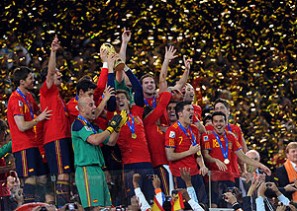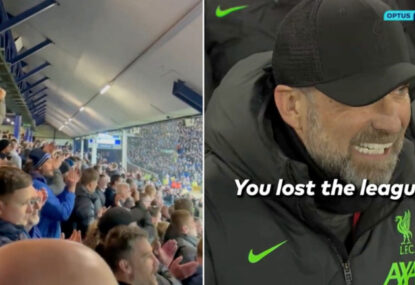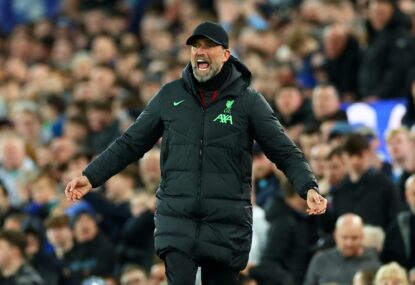Editor’s note: Check the date of this article. Then sit back and read what was said!
In recent times, the success of Spain and their illustrious passing game has shaped the world of football, and many nations have followed in their footsteps.
In both the domestic and international game, Spanish sides have seen extraordinary success in the past 10 years due to the evolution of tiki-taka.
Characterised by short passing and movement, it is this loyalty to their own creation that has crafted success for the Spaniards, but just may be threatening their position as the kings of world football.
For the past five years Spain has undeniably dominated world football on both an international and domestic level.
The fluency and grace they exhibited at EURO 2008 was a play style unlike any other team at the tournament, and Spain accelerated from there on.
In the words of Xavi Hernandez, “We proved to the world that you can win in style. Had we not won the Euros we wouldn’t have won the World Cup.”
And he makes a very good point – the Roja’s first major trophy win in 44 years can arguably be identified as the turning point of recent modern football.
Having suffered a Round of 16 defeat to France just two years before, the Spaniards returned with nine new additions, and an adapted footballing philosophy.
For the first time in many years, Spain had made the world sit up and listen.
Since then, their success has continued and the class of 2008 – 13 have assured themselves as one of the greatest international sides of all time.
But with the 2014 World Cup just eight months away, there seems to be a general indication that this domination is coming to an end.
The tiki-taka movement, born of Johan Cruyff management in its teething stage and continued under his role as director at Barcelona, did not arguably enter the international scene until Luis Aragonés’ role as manager of Spain.
It was the 2008 European championships that Luis first unleashed his adapted tactical methods, where tiki-taka was used to – in the words of Sid Lowe, “Protect a defence that appeared suspect … maintain possession and dominate games.”
The ‘yoyo’ style of attacking/defending in numbers saw Spain score goals in effortless counter attack movements, but also maintain a solid defence that conceded only three goals across the competition.
It is no surprise that the UEFA team of the tournament contained nine Spaniards – including three of the Roja’s back five.
When Aragones stepped down after the European Championships in 2008, it was clear that they needed a manager that could carry the success and culture that Luis had styled, and there is no question that Vicente Del Bosque was the right choice.
The sorcerer’s apprentice worked his magic immediately, eventually carrying the team onto two further major trophies in under four years.
Spain’s passing dominance under Vicente led Spain to their greatest and most significant victories of recent – the 2010 World Cup and EURO 2012.
At the Euros, Spain managed an average of 624 passes a game. A feat contested by Ireland at 221 – but unfortunately not quite matched.
They also blew away claims of being boring, banging in an average of over two goals a game. All that, without a striker.
However, as Spain’s dominance thrived in 2012, and Barcelona soldiered to a spectacular 100-point league season, one game in April 2013 stunned the world.
Bayern’s 7-0 dismantlement of Barcelona across two legs in the Champions League semi-final changed the view of Spanish football – for many – and since then the reputation simply has not been the same.
For the first time in five years a Spanish squad (there were nine in the starting XI) had been crushed.
Across both legs, the stronger, more physical outfit of Bayern strangled the tiki-taka Barca.
The kings of football had finally been overthrown – by an almost unimpaired opposition.
Since the beginning of tiki-taka, fears had existed that if this passing revolution was taken too far, and teams began to rely solely on dominating possession football, soon opposition would find a solution.
As Spain’s time in power progressed, like a raging regime, soon we began to see less flexibility and a feeling of predictability.
This was clearest in Barcelona. At times, like in the UEFA Champions League quarter-final, Barcelona had been unable to create and break down a significantly defensive, counter attacking PSG, who held Barcelona to draws on both occasions.
In times of trouble, Barcelona needed an Ibrahimovic.
They needed somebody who could receive a long ball and wreak havoc in the box – much like the Zlatan who they had previously exiled.
Then the Bayern match happened. All of a sudden the silenced critics of Barca emerged, as the previously suspected was finally revealed. On that night it seemed that for too long Barcelona had relied on a 5’7″ flea to keep them afloat.
What they really needed was a 6’4″ bison. The style and grace that Pep Guardiola had been taught first hand under Cruyff had crumbled under more physical, German efficient opposition.
The final of the competition symbolised what seemed like the close future of football: German dominance combining fluid counter attacks, with formidable, ruthless, engine-like brilliance.
Fast forward 69 days from the Bayern game, and another Hispanic demolition – Brazil 3-0 Spain.
The final of the Confederations Cup saw Spain’s first defeat in a major trophy final since 1984 and their first competitive defeat in 29 games, and was perhaps a reckoning sign that Spain’s command was reaching its final stage – this time on an international level.
The ageing squad of Spain had come on a long way since 2008, yet they could not match the prowess and freshness of a young Brazil team looking to impress.
Like in the Barcelona – Bayern match, the Spaniards enjoyed the majority of possession yet were pressed to submission by the up-tempo Brazilians.
The defensive prowess and flair was something that Spain rarely come across in fixtures and flounder against – remember their previous struggles against Paraguay and a ten-man Chile? – and considering that the Brazilian style of play is spreading the world, this may be a problem for Tiki-Taka in the future.
We are starting to see South Americans emerge successfully in European football more than ever – the PSG team that faced Barca featured six – whilst Oscar, David Luiz and Paulinho are all flourishing closer to home in the English Premier League.
Yet with La Liga so heavily dominated by home-grown talents they do not experience this kind of play week-in, week-out, where the 90 minutes are typically more relaxed.
Not to mention the defensive capabilities of the majority of La Liga, we can see why Barcelona may struggle in latter-stage Champions League fixtures in coming years.
However, the Armada isn’t sunk just yet. And this is where the new generation of Spain come into play.
For decades, it seems that the roots of Spanish sides – similarly to England – have been firmly located in their home nation.
In their match against Brazil, only two of the starting players exhibit their skills outside of Spain – Juan Mata and Fernando Torres, both of Chelsea.
Yet this is not always such a bad thing. Overlooking the troubles I talked about earlier, this does mean that the BBVA get a choice cut of home-grown talent.
One unavoidable problem for Spanish football is age, with the some of the prominent figures of this ‘Golden Generation’ reaching the twilight of their careers. Xavi, Xabi Alonso and Iker Casillas are prime examples of this, who have seen a recent decline in form, been troubled with injuries and been excluded by their clubs respectively.
It has come in good time, then, that a new generation of Spanish midfielders have emerged.
Take Asier Illaramendi, for example. Madrid’s €38m summer signing caused such a shock outside of Spain – I, like many, was very sceptical about Real’s grand expenditure – but it has become clear that Madrid had some method behind their madness.
At 23 years old, the defensive midfielder has not only been brought in to facilitate for a 31-year-old Xabi Alonso, but there is hope that he will lead the line for Spain in years to come.
Last year he ran the engines of Real Sociedad’s midfield – making an average of 50.2 passes per game – whilst maintaining a passing completion rate above 80 percent.
In possession he is purposeful and direct – a contrast to the Spain of late – yet his judgement of the game is exemplary.
His ability to provide structure and diversity to a midfield has drawn comparisons to Thiago Alacantara – both of whom flourished at international under-21 level.
This is exciting for Spanish fans, as together there is a chance that they could provide the Spanish midfield of the future the grit and unpredictability needed.
After all, this is the Thiago that was sought after so heavily by Bayern. And its not even like Madrid have suffered from the tiki-taka blues of late – its been self destruction and hostility that have brought them down.
The loss of Thiago for Barca will be vital, I feel, for the future – where he will flourish into one of the most impressive midfielders in the world, much like Illaramendi.
The signings of Isco, Illaramendi and the like will surely provide them with a home-grown midfield powerful enough, yet stylish enough, to succeed in Europe – even if Barcelona win in Spain once again.
Recently, Madrid have shown urges to move away from their counterpart’s methods, especially under the influence of Carlo Ancelotti, who last month stated, “We don’t need 30 passes…I can’t go against the qualities in my players, and if we find the solution in three passes instead of 30, that’s what we’ll do”.
If anything, this an exciting symbol of things to come.
The loss of Ozil will not be of key significance as Spanish football moves into a new era on the pitch, where, hopefully, more a diversified team will become.
And so if this does all go to plan – with the centre of the park sorted – then they will probably need to bring a striker into the works.
Although Spain have infamously favoured out of playing strikers in past tournaments, their recent campaign to bring Diego Costa into the international side looks very interesting.
Born in Brazil, yet only capped twice, the in-form powerhouse has greatly impressed so far this season.
With ten goals in nine appearances so far, his goals have pushed Atletico to joint top of La Liga – two points above Real.
With a fiery temper and unstoppable power, ‘The Beast’ will no doubt give something extra to the Spain side, and never before has a nickname been so deserved.
With not-so-long-ago stamps, head butts and red cards, if you ever wanted unexpectedness and unpredictability, he is certainly your man.
Just how well he will fare on the international stage we cannot be sure, but at 25 and such great potential, there is no doubt that – if he does start for Spain in his home nation next year – he will be a sign of things to come.
With so many exciting prospects, you’d be forgiven for thinking this was the ‘Golden Generation’.
From looking at all this, you’d be forgiven for thinking that the future of Spanish football – after such a long time of inclusiveness – is found outside of Spain.
Whilst Barcelona will find it hard to lose their religion, there is a general feeling that the times are changing and a shift of emphasis is in swing.
Recovering from their dramatic loss to Dortmund, I suspect that foreign influence will result in Real playing a slightly faster and direct game than previously – led by both Ancelotti and the young talents that will prevail.
If this succeeds domestically, then it would only make sense for the national team to follow.
The almost overnight improvement of PSG, and the perfection of Bayern, have pressured Spanish football into such a position where adapting is the only real option, yet they couldn’t really be in a better position to start afresh.
Spain will always have great players (and great teams in fact) yet if more and more players choose to move away, I would not be surprised.
Young players nowadays – no matter how ‘home-grown’ they might be – are becoming increasingly more well-travelled, and it is time that Spain caught up.
When Cruyff first developed his legendary style, he simply did not have this problem.
Of the 2008 squad, the majority came through the ranks at Barcelona at a time where they were dominating European football.
Today however the increasing global competitiveness of European football has lead to more teams, more options and more playing styles.
It just seems to me that for Spain to succeed in 2014 and beyond, their playing style will need to be altered to compensate for high pressure and counter attacking oppositions, as is the trend of the moment.
The same thing goes for the domestic level, but with such an incredible array of young talents, it seems that Spanish football is not going to have too much of a tough time adjusting to the teams that have spent so long adjusting to play against them.
It’s a concept, I know, but it just seems true. Like all good things, the classic tiki-taka style of football came to an end when its ingenuity ran out and the unpredictability it provided went stale.
It is not so much their fault as it is for the rest of football for learning to outsmart it, that is the way of the game.
But with German clubs leading the way and Brazil looking extremely promising, will the Reign of Spain turn into the Rain on Spain?
We cannot be sure. But we will soon find out.




































































































